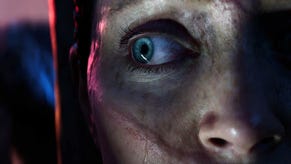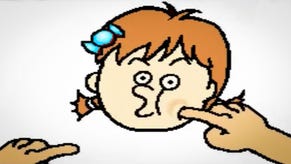The post-peripheral music game evolution implies a bright future for the genre
Key change.
We're long past the days of Guitar Hero, Rock Band, and their plastic instruments. I've still got a whole band's worth knocking around somewhere gathering dust, relics of a very specific era. Going into a Game store and nailing one of the hardest Guitar Hero tracks in front of a crowd is one of my favourite gaming memories - and my proud dad, funnily enough.
But those games have fallen out of favour, be it for cost, environmental reasons, or fashion. Just this week, Guitar Hero creator Harmonix announced its latest game Fuser would be going offline - not played with a plastic instrument, but in-line with the same philosophy of approachable music-making.
Besides, we have Ubisoft's Rocksmith now as the next logical step: a game that teaches you how to play guitar, using an actual guitar. Its latest edition, Rocksmith+, released back in September and promises to teach technique with over 5,000 songs. Perhaps after all that, you might consider writing your own.
Since those Guitar Hero days, though, music games have moved on. Now developers have branched out from simply mimicking an instrument to infusing games from different genres with music.
This year in particular has seen a plethora of music-inspired games that can be broadly split into three categories: rhythm games, genre mixing, and storytelling. Are these the future of music video games?
I say rhythm games, but viral sensation Trombone Champ is more of an anti-rhythm game. The premise is simple enough - use your mouse to slide and match notes - but it's incredibly difficult to master. That, though, is intentional: it's all in the name of comedy.
"I had the idea that the notes that come at you were all spiralling and flowing lines," Holy Wow founder Dan Vecchitto told me. "And I had the mental picture of you trying to match those lines, and usually failing because it's way too hard. And then you could actually hear how off you were. I was imagining it would just sound terrible as you're trying to match it because it's really difficult."
The trombone proved to be the perfect instrument to match that image with both its slide and sound.
"I don't want to call it a silly instrument, but it's an instrument that's ripe for comedy," said Vecchitto. "I don't know if it's the shape, the name, the sounds it makes. Some things are just inherently funnier than others or naturally funnier. And I think the trombone is up there."
Vecchitto is a big fan of Dance Dance Revolution and Japanese arcade games, which inspired the aesthetics of Trombone Champ with its loud music and colourful menus. Indeed, as an initial idea, Trombone Champ actually began life as an arcade cabinet with a trombone controller to play. Except there was a twist:
"I thought it'd be funny if it was rubber so it actually flops around as you're trying to use it," said Vecchitto, though no doubt it would've been impractical.
Still, Vecchitto leaned into comedy with the game's difficulty.
"One of the core ideas behind the game is the fact that you're really not supposed to play it well," he said. "The worse you do, the funnier it is. So that frees up the game in a few ways.
"I don't expect the player to do well, or even want the player to do well. It frees up the level design, because I could put songs in there that are way too difficult to play well. And that actually makes it more enjoyable. People really enjoy the William Tell Overture in the game. And it's nearly impossible to get a good score, but people actually like that the most because it's the funniest to mess up on."
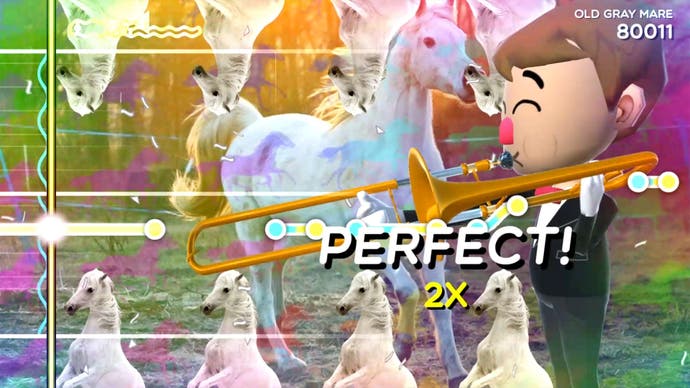
While songs were chosen for their comedic potential, the choice of mainly classical pieces was also as they're royalty free. In addition, original electronic tracks were composed to fit into the "rich history" of music games past. And more are on the way: "it's been the number one demand, just lots more songs," said Vecchitto.
Videos of the game in action soon went viral as players outdid one another in how badly they could play - or even developing real trombone controllers to play with. But Vecchitto didn't expect the game, and its comedy, to resonate so well with players.
"I expected more negative feedback actually, I really expected a lot of people to not get it," he said. "Gamers are very serious about gaming sometimes, they want to get every maximum score, they need to see the perfect 100 percent score on every level, they need to have every achievement, and they just can't rest until they min max everything. So I was actually kind of concerned that a lot of people would react badly to the game, just because some of the levels are pretty much impossible to get to do that with."
Vecchitto described the reaction from players as "overwhelming". "We were blown away," he said, with clear enthusiasm. "We did not expect this at all. I knew the concept was funny. I knew it was memeable... But I didn't really think that would actually lead to the game itself becoming popular."
Beyond rhythm games, some developers are injecting musical elements into existing genres. In the recent past we've seen the likes of Crypt of the Necrodancer fuse rhythm with dungeon crawling, and No Straight Roads set action platforming to a beat. Earlier this year, top down shooter Soundfall gave new meaning to a pulse rifle, while next year will see rhythm tower defence game Rhythm Towers and rhythm puzzle game Rytmos.
Perhaps the most successful of these this year was Metal: Hellsinger. It's not the first time a first-person shooter has been combined with rhythmic gameplay, but this game in particular just exudes metal - from the thundering drums to its demonic visuals mimicking album cover art.
The game's creator David Goldfarb told me he was inspired by playing Doom 2016 while listening to some other music. "And I decided to fire on the beat because it felt like it was rewarding. I think I liked the shots lined up with the song," he said, explaining the hellish plot came later.
He continued: "To me, the nature of first person shooters is there's a flow in playing any good shooter and being good. That is, I don't know if you'd call it rhythmic, but you get into a certain state if you're playing something at a high enough level, where they're just doing the thing, and you're not thinking about what you're doing.
"And a lot of rhythm games are especially good at getting you into a flow state. That's what the nature of rhythm games is: you feel like you're performing this thing that you couldn't do - for many people anyway, people that can't play music - that gives you the feeling of achieving something like that.
"So I was very interested in how it would feel if we combined those two things, because having flow in a shooter because you have freedom of movement and you can do whatever you want is one thing. And then what if that was laid on top of this thing where you have this kind of rhythmic requirement, but it's a requirement that also allows for improvisation in terms of player action.
"My hope was that it would feel better than just giving people total freedom of movement, because... you have a different relationship to the music and you have a different relationship to the way that you play when those things are in effect."
The player is free to move around at will, but actions like dodging, firing, and reloading must all be done on the beat to maintain power and combo score. Goldfarb and his team managed to make this into a strong, early prototype, but from there the level design and the music composition were done in parallel. That proved a challenge when game design often slots in audio at the end.
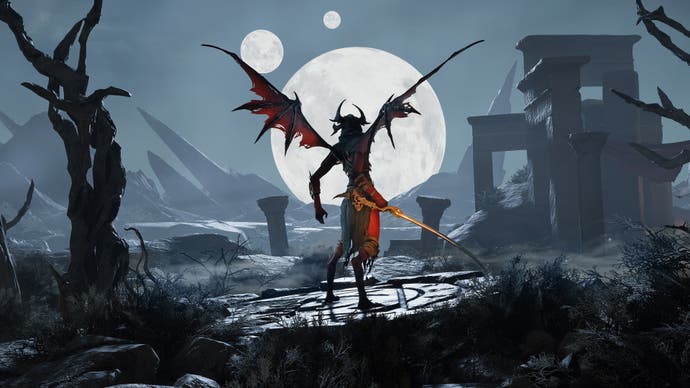
"I think the levels were being built around what we knew the story was, but then the music, we would look at the levels and think about the narrative and we'd be like 'okay, it's going to be this kind of vibe, that means the song is probably going to be like this'," said Goldfarb.
"[The composers] would start working on pieces of a song and we would see how it felt. And then we put it in a level and then see if it will work with the geometry because sometimes if it's too fast or if maybe the level's too cluttered, it's not good for a certain kind of pace. So we had to figure that stuff out."
That also made the game's difficulty hard to balance. "You have people that are better at playing shooters, but when you add a rhythm component, they turn to garbage," quips Goldfarb, detailing the back and forth between playtesters and the development team.
Original music was used in part to avoid copyright infringement - especially for streamers - as well as the fact labels don't supply songs with separate layers for guitars, vocals, and drums. But most of all it was to create synergy between the music and the gameplay.
"[Licensed songs] would have changed the gameplay experience dramatically, because it wouldn't have been dynamic. You would have just been playing along a static track," said Goldfarb.
That also meant working with well known metal artists from bands like Trivium, System of a Down, and Lamb of God, something Goldfarb was clearly excited about. Those artists lend the game authenticity, which extends to its overall aesthetic too.
Said Goldfarb: "We went our way. We went all in to make sure that we treated metal with respect in all the ways that we could, whether it was visual design or the music or it was the animation and throwing up the horns in the menu, whatever it was. I think we really tried to make a tribute to the genre."
Some music games are less interested in having the player perform and more into music as a narrative device. Last year's The Artful Escape used just one button to shred an awesome guitar solo, but that empowers the player to really get into the mindset of its teenage musical prodigy protagonist breaking free of the glum folk songs of his father and embrace the psychedelic exuberance of glam rock.
Riley and Rochelle, released this year, tasks players with unravelling the relationship of its titular characters - both musicians. Snippets of their stories must be pieced together through written notes, audio interviews, and sometimes even music itself. Rifling through the virtual vinyl crate not only uncovers some great 90s-inspired tunes, but clues in dates and lyrics.
Then there's We Are OFK, a game that tells the story of a fictional band in Los Angeles through a mix of visual novel and interactive music videos. But more than that, the songs have been released and the virtual band is real. It's not just a game, but an introduction.
"You were saying games are using music in different ways," said We Are OFK creator and lead singer Teddy Dief. "And I almost kind of feel like we're using a video game, if you know what I mean, which I feel funny saying because it's not like we're making a video game, haphazardly, right? It took four and a half years, but the game is serving a different purpose."
That said, the game design process started with story first. It's divided into five episodes, each focused on a specific character and including a thematically appropriate music video. Once that structure was in place, Dief worked with songwriters and producers Luna Shadows and Thom Powers (of The Naked and Famous) to write the songs.
"We're not trying to do musical theatre here," said Dief, explaining the constraints of the songwriting brief. "They're not singing about what they're seeing and doing. It's just meant to fit tonally and emotionally. And maybe you can make some allusions here and there to the specifics of how these people might be feeling."
Dief then sang the songs with an "intentionally breathy" vocal that lends the music a dreamy, ethereal quality. "I had a lot of fun with that because the big thing I was doing musically at the time was learning how to sing on mic," they said. "I came from theatre and musicals and stuff and the microphone technique is a whole different beast and learning how to use breath to emote."
So why create a video game as an EP instead of a standalone music release? For Dief it was important to tell the story behind making a record, to show vulnerability.
"The moment you even start thinking about fucking around with art or music, you're looking at these incredibly intimidating works," they said. "The goal of this thing was to be human sized. And to be like, 'look, this is hard'. We're gonna tell a story that doesn't take them from rags to riches, they're just gonna get the EP out. They don't win at the end, they don't make any money with that EP. They just release it."
And while it made sense for Dief and their team to create this story as a video game with the tools and skills available to them, video games afford a different type of storytelling.
"Making it interactive does give us an opportunity to get people inside the characters' heads," said Dief. "And there's a different type of storytelling: putting you into their shoes and having you make choices for them and having you see the things they could have said, not just the things that they do say. I think we wrote all of the dialogue choices not to make you a god in control of 'is this character going to become kind or an asshole', but to be like, this character is flawed in this way."

All the developers I spoke to have an interest in music. Vecchitto plays a lot of instruments, though ironically not trombone; and Goldfarb has long been a fan of punk, metal, and alternative rock. Dief trained as a singer before moving into video games, but working on We Are OFK allowed them to integrate music and gaming in a novel way.
"For me specifically, it has become an opportunity to pivot myself from a game maker who sings, which I have been to a lot of people for a long time, to a musician who makes games," they said.
"And to keep playing those off of each other, because I've always found it really interesting how much so many game makers adore and are fascinated with music as a medium. And so many musicians think video games are the future of creativity. So they're always shouting at each other about how excited they are about each other. So it's fun to be in both spaces."
We Are OFK is therefore a springboard for a virtual band, not just a fun narrative video game with music but an example of gaming used to launch the careers of real life musicians. The next step for Dief, therefore, is for the band to play live.
"What's next is we are working on new music and trying to figure out how to start playing some shows because we need to reinforce that it's a music project," said Dief, clearly passionate about the project and its future. "We are still here. The music isn't a marketing ploy. We told the story and we also have a band so we're gonna keep doing that."
Of course, video games can take years to make, which would slow the progress of a virtual band. But We Are OFK proves that the future of music games may well impact the future of the music industry itself.
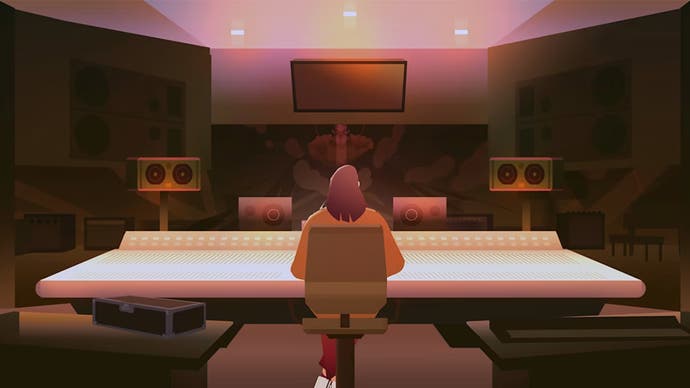








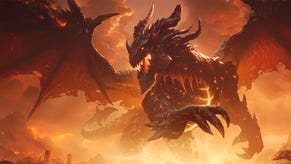
.png?width=291&height=164&fit=crop&quality=80&format=jpg&auto=webp)
